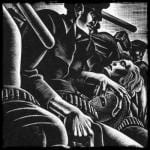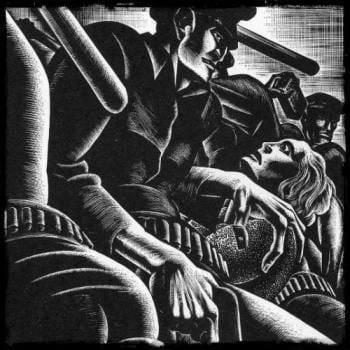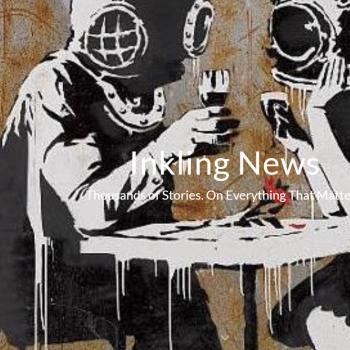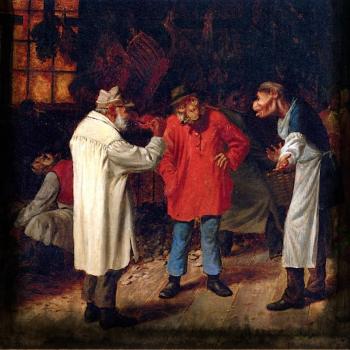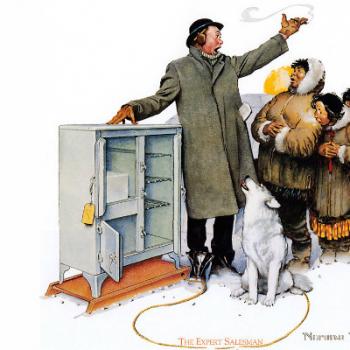

The road trip was a surreal window into our moment, with unspeakably beautiful western states landscapes ruptured by highway vistas of Trump shrines and Trump campaign buses and highway rest stops where we were reliably the only ones wearing masks.
While driving, we listened to the first third of William Shirer’s The Rise and Fall of the Third Reich (the entire book is 1,700 pages long), which with chilling precision unspools Hitler’s rise as a comedy of errors, a lens on the rise of Trump and his allies that for me, as we sped our way through literal Trump country, also ruptured any remaining shred of doubt about America’s own nihilistic, fascist turn and the starkness of our moment.
Portland, Maine itself summoned some of the same antic, misbegotten energy, with weekend street fairs and outdoor restaurant dining framing a Black Lives Matter protest ruptured by a handful of belligerently hostile (and vocal) Trump supporters waving Blue Lives Matter flags.

We stopped by the racetrack in Saratoga, New York on the last day of our journey. The horses and jockeys competed before an empty grandstand.
I realized the conceptual tools available to us in Western liberal philosophical traditions — the belief in agency, autonomy, choice, free will — are like blinkers worn by racehorses that recursively trap us into running the same loop over and over again. And that if we would find our way, we must shed the blinkers and, indeed, leave the track altogether.
There is a path forward. But we need to reimagine what that path might look like and how the tools of our liberal tradition might blinker our sense of what is possible.
This is the hard part. The path away from the track — to the world outside the track — is forked. Traditional western binaries — and Robert Frost’s bitter imperative in “The Road Not Taken” — instruct us to choose one and live with the consequences. But in our present circumstances, to choose one path — the short-term path of expedience or the long-term path of principle — spells certain ruin. Our national fate, our planetary fate, requires that we must learn to take both paths. At the same time. There will be more on this.
My 91-year old mother lives in a retirement community near Portland. For out-of-state visitors, Maine mandates either a 14-day quarantine or a COVID test, with negative results, within 3 days of arrival at the Maine border for out-of-state visitors. We took our tests 4 days prior to arrival and, because of shockingly speedy lab results, received confirmation our COVID negative status a bit longer than 3 days prior.
My mother has been essentially confined to quarters since March. She is ornery. Her retirement community does permit visitors, but under tightly controlled conditions, on the premises, that essentially obviate that possibility for anyone arriving from out of state. However, my mother reported to me that, somewhat weirdly, her community had no issues if residents wanted to leave the premises in the vehicle of a visitor.
Our goal that Saturday morning was to drive my mother to Ipswich, Massachusetts, some 2 hours south, and spend time with my sister, her husband, and my oldest son, who along with his girlfriend, happened to be in Gloucester for the weekend. However, there was still the matter of the “security detail” at my mother’s residence. They would be checking ID and asking questions and could conceivably stymie our plan were they to apply strictly the 3-day test rule.
Another potential snafu concerned the drive to Massachusetts, a “non-exempt” state. The visit technically would require my mother to quarantine for 14 days upon her return to Maine later that day. Never mind the fact that traveling in a private vehicle — the safest form of personal protective gear — in the masked-up company of two COVID-negative humans, to socially distance on the deck of a home in a community that has basically had no reported COVID cases, was undoubtedly safer than a visit to any random restaurant in Portland to which we might have taken my mother.
In any event, my mother was prepared to risk a request from staff to quarantine should anyone learn she had been in Massachusetts. “It’s not like I’m not already in quarantine,” she told us.
The security guard merely asked our business and waved us through. He did not request ID or evidence of COVID testing. My mother was waiting outside the entrance to her building. We hustled her into the car and spirited her away to Ipswich. A prison break for the ages.

The nut of the matter is not that complicated. It rarely is. We know, from what other nations have done, how to get a handle on COVID. We have known for years the risks of climate change and possess the technical and policy wherewithal to at least manage its impacts. We can reverse deforestation and other human activities that have unleashed one of the greatest and most rapid extinction events in history. And finally, we may not have fully arrived at the moment of racial reckoning our nation needs, but we are close enough to appreciating the harms (our nausea as we contemplate those harms tells us that much). We know, as a nation, what it might look like to clear a path forward. To accommodate some durable restitution and healing.
To repeat. The nut of the matter — the signal — is not complicated. It is the noise surrounding that signal that obfuscates us. There has always been noise, of course. That is the simple definition of a democracy, I suppose. That without the noise there can be no signal at all. Only a dial tone. Or a test pattern on a television screen. But few would argue that the digital era has not amplified the noise cacophonously and at times distorted the signal beyond recognition.
What buffers the signal from the noise? What holds space in a democracy? What grounds us? What makes us non-particulate solids?
We look to our Constitution to tell us how to govern ourselves. We assume the answers are there. But it turns out the Constitution, all 4,543 words of it (7,591 words if one includes the Bill of Rights) is an inadequate operating manual, written in a fortnight by technical writers inventing the technology at the same time they were writing the manual. Indeed, the manual is, in a sense, the technology.
I am making two points here. First, the Constitution has no answers. It can only hold space and remain alive for our democracy, for our dream of freedom and inclusion, when each generation spins new webs of illusion around what Alexander Hamilton called its “frail and worthless fabric,” these illusions the spun cotton that clothes and swaddles us as a nation, the noise receding like a retreating tide at night leaving us to quiet contemplation of the signal — the lapping waves, the sand, and the stars.
My mother’s prison break illustrates this first point. We recognized the inadequacy and contradictions of the “rules” governing her movements, spun a new illusion around the fabric, and shaped reality to the possibilities disclosed. Similarly, there is no reason to assume institutions or traditions such as the Senate filibuster possess any value or legitimacy for our moment, if indeed they ever did. Like flung-down equestrian monuments, the filibuster’s time has passed. We can shape a new reality around the possibilities for new institutions removing the filibuster will disclose.
Second, to hold space together, as a nation, we will need to imagine and form a radical political center, an oxymoron that acknowledges and embraces complexity and contradiction as the inherent glory of our species. That is the meaning of the forked road. We each need to be multitudes, where we simultaneously play the short game and the long game, the expedient game and the principled game.
On my return flight, United Airlines played social distancing announcements on loop while packing every one of its seats with passengers.
Back in Washington state on September 11, the smoke-spumed particulate sky turned blood-orange and then crimson, long before sunset, a memory flare from 2001, the fire next time. We are a dying nation athwart a dying planet, I thought, our lives merely simulacra of something solid. Particulate lives. It just seemed like really bad science fiction.
My seal died while I was away. So did my older son’s dog. So did my friend Garth.
In this dark time, we must each light our own candle. This is how we can remain non-particulate solids and prevent ourselves from disaggregating and floating away. We need to become free radicals, generating our own gravity.
The time for cynicism is past. Cynicism is decadent. Removing Trump and reclaiming the Senate will not solve our problems. But we cannot move forward at all without taking that first step. We also know that night will rapidly and perhaps permanently descend on our nation if we fail on this threshold. We either join together to fight or float away separately to die. This may truly be our last chance.

